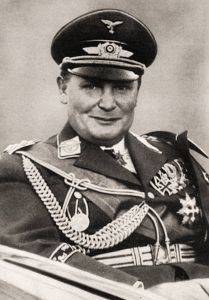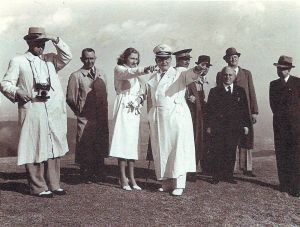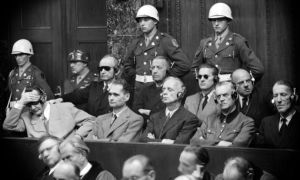German politician, general and war criminal
 Born in Rosenheim, 12 January 1893 near Nuremberg, he was a skilled fighter pilot in the German air force during World War I.
Born in Rosenheim, 12 January 1893 near Nuremberg, he was a skilled fighter pilot in the German air force during World War I.
After the war he joined the Nazi Party, quickly becoming Adolf Hitler's top lieutenant. Gifted with great energy and determination, he was at Hitler's side with often decisive responsibility throughout the initial stages of Nazism until the seizure of power and the establishment of the Third Reich
.
After coming to power, Göring amassed a large number of titles, offices, awards and material possessions, following an extravagant and dissolute lifestyle.
He carried out major political activities within the Reich, directing, with the supreme title of Reich Marshal, the creation of the Luftwaffe, the establishment of the secret police, repressive activities and the concentration and extermination system.
Field Marshal Hermann Göring, from 5 March to 9 May 1939, with sudden departures and returns, was in San Remo for a long holiday, staying at the Hôtel Royal, accompanied by his wife Emmy Sonnemann, his niece Ellen and a large escort.
At the beginning of May, he was also joined by his sister Olga Riegele.
 His stay on the Riviera was actually interspersed with absences of a few days due to unavoidable political and governmental commitments that took him to Berlin, Africa and Rome.
His stay on the Riviera was actually interspersed with absences of a few days due to unavoidable political and governmental commitments that took him to Berlin, Africa and Rome.
Göring, who was also president of the Reichstag and the Defence Council as well as commander-in-chief of the Air Force, often strolled through the streets of the city, attended the Corso fiorito (flower parade) admiring the flowered wagons as they drove up and down Corso Umberto (now Corso Mombello), played tennis on the Solaro courts, climbed to the top of Monte Bignone and visited the city parks.
His Mercedes, fresh from the factory, took part in the Coppa Impero Concours d'Elegance and on 26 March, his wife Emmy's birthday, he attended a party in her honour at the Casino.
On 9 May, he embarked on the Germanic motorboat Huascaran for Spain. He would never return to San Remo.

Four months later, the Second World War broke out, at the end of which he was sentenced to death during the Nuremberg Trials for his war crimes.
He committed suicide on the eve of his execution, on 15 October 1946.
(sources: from the book "Sanremo e l'Europa, l'Immagine della Città tra Otto e Novecento" edited by Letizia Lodi; ediz. Scalpendi, 2018; Wikipedia)




